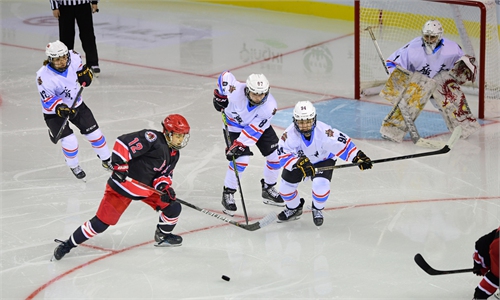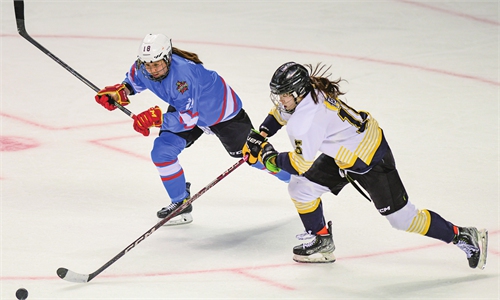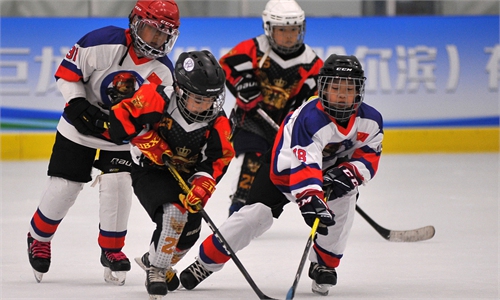ARTS / CULTURE & LEISURE
How did Chinese women's ice hockey return to top division?

Illustration: Liu Xiangya / Global Times
After five successful wins in the Division I Group A competition of the women's ice hockey world championship in Shenzhen, Team China has successfully returned to the top division of the world championship after a 14-year hiatus. The news has thrilled many ice hockey fans in China, as the team, once top-four finishers at the world championships in the 1990s, has started their campaign to revive their old-time glory.
Key to this resurgence was the foundation built upon the Kunlun Red Star (KRS) club in Shenzhen, South China's Guangdong Province. After Beijing won the 2022 Winter Olympics hosting rights, the KRS ice hockey club was established, featuring the mainly Chinese national ice hockey team players, with the men's team located in Beijing and women's team in Shenzhen.
The women's team has engaged in intense matches in the Canadian and Russian leagues since its inception. This strategy not only honed their skills but also brought them closer to the caliber of the world's top teams. Canadian Scott Spencer, current head coach of the Chinese women's national ice hockey team and formerly the man at the helm of the Shenzhen team, told the Global Times that the team plans to continue training in Canada after the Division IA games.
While a recent investigation into China's winter sports management might deal an impact to all winter sports operations in a short period, China's commitment to fostering international exchanges and advancing the sport is unlikely to waver as arranging for teams to play overseas can further improve the players' ability to compete in international competitions.
The growing pool of talent from various regions within China had also molded them into a more versatile unit. Over the past five years, more and more ice hockey clubs have been established across China as regional sports authorities are hoping to cultivate their own home-grown ice hockey stars. This is a big contrast to the beginning of the 21st century when China's national team players were mainly from Northeast China, where winter sports thrive in the region.
In the 1990s, the Chinese women's ice hockey team boasted formidable strength. As the team representing Asia, China made its first appearance in the women's ice hockey world championship in 1992 and secured a place among the top four teams in both the 1994 and 1997 editions. In their debut at the Winter Olympics, the team was just one place behind for a medal finish in 1998.
However, entering the 21st century, a decline set in due to a lack of talent and resources. In 2009, the team slipped from the top division to Division IA of the worlds, followed by a further relegation to Division IB in 2011. On top of the underachieving performances at the worlds, the team also missed out two consecutive Winter Olympics in Sochi 2014 and Pyeongchang 2018 until making an appearance in Beijing 2022 as the participation of the hosts did not require going through qualifications.
A ninth finish at the home Winter Olympics in Beijing may have been far from satisfying, but it became a confidence booster for the team's revival on the international stage. Following the culmination of the Olympics, the team had a five-game winning run at the Division IB games of the worlds that got them promoted to Division IA in 2022. Following that, their sweeping victories at the IA games in 2023 secured them a berth in the pinnacle of international competition at the worlds in 2024. Notably, they are the first team in six years to clinch the championship title in Division IA with an undefeated record.
Looking ahead, the national women's ice hockey team is poised to tackle upcoming international challenges, including the top division games of the world championship in 2024, the home Asian Winter Games in Harbin, Northeast China's Heilongjiang Province, and, of course, the Winter Olympics qualifiers.
Their inspiring journey not only signifies their remarkable progress as a team but also underscores the national efforts in boosting winter sports in China. With the expanding talent pool in the domestic ice hockey scene and the inclusion of domestic youth ice hockey events such as the National Winter Games, optimism abounds that the women's ice hockey team will once again bask in the glory of yesteryear.
The author is a reporter with the Global Times. life@globaltimes.com.cn



